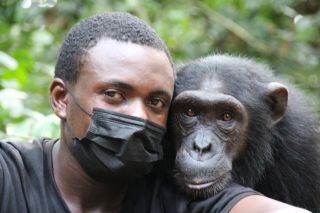Intelligence
Are Humans Superior to Other Animals?
A curious high school student asks if language makes humans special.
Posted March 14, 2023 Reviewed by Vanessa Lancaster
Key points
- Many nonhuman animals exhibit behaviors that vastly exceed human capacities.
- Imitation and social learning occur in species ranging from honey bees to chimpanzees.
- The evolution of our special capacity to use symbolic language to transmit knowledge made cumulative culture a uniquely human phenomenon.

One of the perks of writing a book for a general audience is that you occasionally receive mail from enthusiastic young readers. Recently, a high school student emailed me a thought-provoking question about the differences between humans and other species:
Dear Dr. Herzog,
My name is Asya. I am a sixteen years old junior in high school, and I’m about to finish your book Some We Love, Some We Hate, Some We Eat. It opened my eyes to many interesting intellectual topics, and I now bore my parents with conversations about dog genomes and mouse IQ indexes.
I am writing you about a question I have been thinking about for days. Forgive me if I am wrong, but in your book, you suggest that one reason humans are superior and have more developed mental capacities than other animals is because of our ability to learn language. But, we only learn human languages: French, Arabic, Thai, etc. A human cannot learn to bark like a dog or moo like a cow, right?
So who's to say animals can't learn different ways to communicate with their own species or, for that matter, those of other species?
Sincerely
Asya
Asya’s question is related to an issue I think about a lot–are humans special? Here's my answer to her.
Dear Asya,
I am glad you are enjoying my book even though your parents are getting bored hearing about it. (My wife feels the same way.)
You are raising very important issues. For example, what are the differences between humans and other species? And what do these differences mean for the way we should treat animals? I cannot address all these in an e-mail, but here are some of my thoughts on what makes humans different from other species.
Are humans “superior” to other animals?
No. In my book, I did not mean to imply that humans are generally superior to other animals. The fact is that many species are superior in their own unique ways. Bats, for example, are superior to humans in their ability to “see” in total darkness. Salmon use the earth’s magnetic field to navigate across oceans. Horned dung beetles can pull a load 1,400 times their body weight. And the brain of an elephant is three times larger than the human brain. Scientists have shown that many capacities once thought to be exclusively human are also found in other species. These include emotions such as empathy, happiness and grief, tool use, the ability to count, a sense of fairness, and perhaps, even awe.
Further, the social transmission of behavior is not limited to our species. Indeed, the study of cultures in the animal kingdom has become a burgeoning field of research. A few examples are tool-making in New Caledonian crows, food preferences in monkeys, whale hunting traditions, and the cranes' migration routes. (Two of my favorite examples of culture in animals are the social transmission of foraging techniques in honey bees and a sudden fad among a group of chimpanzees for sticking a blade of grass in their ear.)
Language in Humans and Other Species
Your question, Asya, focuses on a controversial topic–whether nonhuman animals have languages. You are right in thinking that many species have complex communication systems that are learned. These include the songs of birds and whales and even the famous waggle dance of honey bees. Further, scientists have deciphered a lot about the meanings of the calls and signals of creatures ranging from spiders to monkeys. But researchers disagree about whether these communication systems are true languages. The psychologist Herbert Terrace, for example, says no, while prairie dog researcher Con Slobodchikoff says they do.
As you point out, humans are not good at barking like a dog. But sometimes, we can communicate directly with members of other species. For example, I learned to talk “alligator” when studying how baby gators communicate with their moms. I could imitate their distress calls by making little yelps from the back of my throat. Even today, when my wife and I are in gator country, I use this skill to call in mama gators. And it only took me a few minutes to teach the baby gator alarm signals to Julius, my 8-year-old grandson. Now he can call in adult gators.
And some animals learn to communicate with other species. Dogs are perhaps the best example. They let their owners know when they want to go for a walk, and unlike wolves, they will often turn to their owners for advice when trying to solve a problem. And the famous border collie, Chaser even learned the names of 1,000 toys.
Do language and culture make us special?
However, we are unique among animals when it comes to our ability to learn and use symbolic language. Like Chaser, the typical three-year-old child can recognize about 1,000 words. But by the time they are five, the average kid can recognize 10,000 words. Further, children pick up the meaning of words and the rules of grammar largely on their own, with little or no formal instruction.
Efforts in the 1960s and 1970s to teach apes and dolphins to use symbol-based communication systems meaningfully were dismal failures, often with tragic endings. Our ability to use symbolic language means that humans are exceptional in the degree we can absorb, pass on, and use cultural information. As Dietrich Stout and Erin Hecht wrote, “No other species approaches the extent, diversity, and complexity of human culture, but we remain unsure how this came to be. The very uniqueness of human culture is both a puzzle and a problem.”
The bottom line is that many animals are special in their own way–a vampire bat can see in the dark, and a Clark’s nutcracker can remember the precise location of 10,000 stored pine seeds. But humans are also exceptional. The flexibility of symbolic language means that we can understand and communicate infinite ideas and meanings.
As a result, we have iPhones and spaceships while chimpanzees, our closest relative, the chimpanzee, has been stuck using the same method of using stones to break open nuts for five million years. Indeed, the smartest chimp who ever lived could not come close to asking your insightful question about the difference between humans and other animals.
There are, of course, thorny ethical questions raised by the fact that humans are, in some ways, undeniably special. But that’s a conversation for another day.
References
Herzog, H. (2021, second edition). Some We Love, Some We Hate, Some We Eat: Why It's So Hard to Think Straight About Animals. New York, HarperCollins.
Whiten, A. (2021). The burgeoning reach of animal culture. Science, 372(6537), eabe6514.
Stout, D., & Hecht, E. E. (2017). Evolutionary neuroscience of cumulative culture. Proceedings of the National Academy of Sciences, 114(30), 7861-7868.
Law, F., Mahr, T., Schneeberg, A., & Edwards, J. A. N. (2017). Vocabulary size and auditory word recognition in preschool children. Applied psycholinguistics, 38(1), 89-125.




